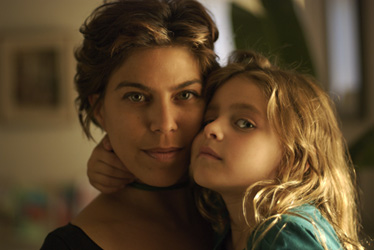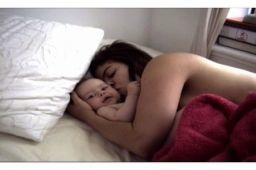
"One minute I'm in that bubble of new motherhood, and the next I'm told I have breast cancer," filmmaker Lori Benson says in her documentary film that pieces together the reality of her personal crisis. Dear Talula is a compelling portrait of a woman whose grace, good humor and courage allow her to transform her diagnosis into an opportunity to make a difference.
The film shows Lori as she navigates the New York City medical system when diagnosed with breast cancer after a routine check-up. Lori's proactive approach to her femininity and her role as a mother, to then 14-month old Talula, transcend everything. In an interview, Lori discussed her inspiration for making the film, its impact on her life and new passion for outreach.
Why did you decide to make a film?
Partly, it's what I know. I'm a filmmaker. My husband (at the time), also a filmmaker, and friends followed me around with a camera from diagnosis through treatment. In hindsight, I don't know if I'd be so bold and do it again but there's a lot of power in sharing a personal story and capturing the story in real time.
Describe your film making process.
I shot for a few years, put a trailer together, raised money, edited the film for six months, and ultimately licensed the film to HBO. It took about three years. 
There's a lot of irreverence in the film. Especially when it comes to body image. What's that about?
Women are so body identified. So, when faced with losing a part of yourself, especially the part that's so media-specific, you have no choice but to let go. My upper body was always my thing. The thing you saw. But when I was diagnosed with breast cancer, a body part that is the object of desire, sells everything, feeds your baby... I had to get very real with myself very fast. Maybe it was in defiance, but I said, 'Wait a minute. Are breasts that important?' What was important was that I perceived myself as a desirable woman. And I said this to myself over and over again. No, the cancer doesn't define me. No, the breasts don't define me. As to body image, it's the attitude that's sexy.
What are some of the misconceptions people have about cancer?
I think the hardest thing in the world is to hear the words 'you have cancer' because you immediately wonder 'how long do I have?' But what I now know is that some cancers can be treated. (Cured) or kept at bay for a long time, and maybe not come back. Also, I think people hear 'cancer' and they think they will see a different person. I guess I did initially feel different. But it didn't take long for me to meet other young women diagnosed with breast cancer. The fact is many young women get breast cancer. That's pretty shocking if you ask me.
In making this film, you've been able to connect with a wider audience than you might if you were a member of a support group.
I had no idea the story would have the broad appeal that it's received. In part, I felt the (breast cancer) topic had been exhausted but it turns out that the early footage is what resonates most closely with viewers. I've received lots of letters in appreciation and people point blank say, it's changed their lives. Now that's a gift.
 Would you mind sharing some of the feedback?
Would you mind sharing some of the feedback?
One woman wrote how she, too, was a young mother with a 15-month old baby, and watching me go through the preparation for breast surgery was exactly what she experienced. The fact that I was in my thirties gave her hope. A college student wrote about a newfound appreciation for her own mother whose strength of character was similar to mine. Seeing the film also made her realize the importance of doing her own breast exams.
Tell me about your outreach.
My aim is to encourage young women, and young doctors to embrace the importance of breast health and to create a supportive forum for women diagnosed to share the issues they face. Ideally, I want to make the film available on college campuses, medical schools, hospitals and in cancer centers, anywhere people go for support. I've partnered with a number of organizations, including the Maurer Foundation, Art Catalyst and BreastCancer.org. I am grateful for their belief in my efforts.
You've targeted medical students as part of your outreach. How did they respond?
It's been extraordinary talking with them about the importance of compassion and how it feels to be a patient just diagnosed with something as scary as breast cancer. It doesn't take much, people don't want to be treated like a number. One student told me that many of his colleagues thought my presentation was the most impactful they had experienced. He told me this would stay with him throughout medical school and his time as a doctor. He believed every medical student in the country should see the film. I can't think of a better endorsement.
The film aired on HBO/Cinemax in October. You're HBO interview is podcast on iTunes, you've been a guest on The View (scroll to "Hot Topics Breast Cancer, Part 2") and Whoopi Goldberg's radio show. What's next?
I have received hundreds of letters from people asking for the film so they can share it with a friend, a sister, a mother, a daughter, a girlfriend - someone they love. What an honor that is. I'm trying to figure out how to fulfill these requests and reach as many people as possible.
Any plans for your next film?
Yes! I recently read Kathleen Kingsbury's cover story for Time magazine, "The Changing Face of Breast Cancer." It's about the rise of breast cancer around the world. I had no idea that it was so prevalent in Asia, Africa, Eastern Europe and Latin America. Not only do many women not have access to relevant healthcare, in many countries there are cultural taboos associated with disease that need to be addressed. I see it as a human rights and even a women's rights issue. I think that making a film would bring this global issue to the public eye and I'd like to investigate further.
Is there anything else on your mind?
I'm still struggling with my own mortality. I'm afraid of the cancer coming back but I hold dear the survival moments and the fragility of life. Making the film has made my life so much richer and it came in such an unexpected way. The film came together because of the many wonderful people around me. I now have the opportunity to give back. I am inspired every day to know that I can make a difference, not only for Talula, who is six now, but also for the next generation of women and physicians, at home. And with hope, abroad.